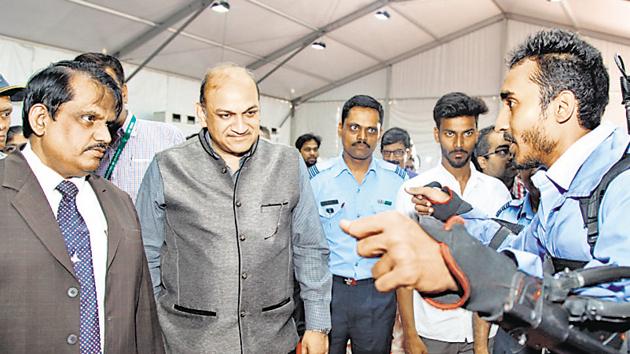COEP students develop compressed air powered human exoskeleton to lift weight off soldiers’ shoulders
The project, showcased at DRDO’s robotics and unmanned system exposition on May 25, won third prize and ₹50,000 at the event
Students of college of engineering Pune (COEP) have developed a compressed air powered human exoskeleton device to help the Indian soldiers during combat and to carry heavy loads in hilly terrain.

The project, guided by Shantipal Ohol and developed by Bhushan Darekar, Prabhakar Naik, Jayant Undhe, Sushant Soudhe and Manthan Pawar, was showcased at the defence research and development organisation’s (DRDO) robotics and unmanned system exposition (DRUSE) held at the defence institute of advanced technology (DIAT) on May 25. The prototype bagged the students the third prize in the competition and a ₹50,000 cash prize.
Bhushan Darekar, said, “This is a suit which will help soldiers carry heavy loads. The upper body of the suit is attached with pneumatic artificial muscle (extensional devices operated by pressurized air filling a pneumatic bladder) and the passive lower body suit, with a control enabled locking mechanism, is used to transfer the force through the links to the ground. This will be helpful for carrying heavy weapons and ammunition in hilly areas.”
Developing the prototype though, was no easy task. Initially pressure control was used to help the lifting action, but in the first prototype, the team realised that the weight load was putting strain on the shoulders and the backbone of the user. To reduce the strain, the team developed a lower body suit.
“We are using 5200mAh batteries. This will allow the suit to work for up to one hour. However, if stronger batteries are used, it can be used for four to five hours. The device will be invaluable for soldiers who carry heavy loads in rough terrain such as the Siachen glacier, Kargil or other hilly areas,” said Prabhakar Naik.
The project was introduced by Bhushan during his BTech course in 2016. He developed the idea with the help of other students and with the guidance from Ohol.
“This is a self-funded project and we directly participated in the DRUSE competition. We are glad that our idea has been recognised and we will work on this project to make it more convenient,” said Bhushan.
Out of 1,088 teams from across country, 162 teams qualified for the first round of the DRUSE competition. In the second round of evaluation, 30 teams qualified. The 30 teams were evaluated by a high level expert committee on May 24.
Ayuda bags first prize
A six-wheeled robot known as ‘Ayuda’ for soldier assistance and surveillance, developed by a team from MES college of engineering, Malappuram, Kerala, won the first prize and ₹1.5 lakh as a cash prize. The team consisting of Fazila Salim, Suraj K, Faris T, Basith KV, led by team leader KK Dibu, was guided by Maya G from the college. Indian institute of technology, Kharagpur’s team concept of a ‘multi-terrain heterogeneous swarm’, proposed for surveillance of multi-storey buildings, won the second prize and ₹1 lakh.



